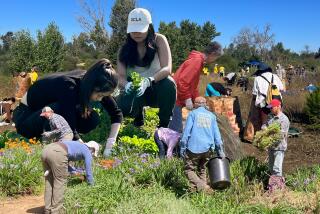National Laurels for a Branch Manager
- Share via
As a young girl growing up in Arkansas, Jeanne Marie Eslinger climbed dogwood and cottonwood trees, and swung from a tire attached to a pecan tree behind her home.
Now Eslinger plants trees like those she used to play in.
“I’ve always loved trees,” the longtime community activist and volunteer said.
That fondness, plus alarm over what she describes as the “concretization of America” prompted Eslinger to begin a tree-planting crusade that recently was recognized by national leaders.
The 32-year Fullerton resident was selected as one of the country’s 28 most dedicated volunteers, and will receive a citation signed by President Clinton for her citywide environmental programs.
“Receipt of such an honor is testament to an impressive record of dedication and service,” Sen. Barbara Boxer (D-Calif.) recently wrote to Eslinger.
With help from Soroptimist International of Fullerton, Eslinger established a tree-planting program in 1991. She spoke to fifth-graders about the importance of trees to the environment and developed training manuals for teachers.
Eslinger, a retired marriage, family and child therapist and former Fullerton Woman of the Year, also initiated a Chamber of Commerce program in which new business owners were given a tree to plant at their business or home.
Furthermore, she led the Soroptimist Club effort to plant a flower and tree garden at Hillcrest Park. Last month, she planted nine jacaranda trees there, buying them with part of a $1,000 award she received from the Volunteer Center of Greater Orange County in 1995.
She said she plans to use the rest of that award to buy a bench and more trees for the park. She’s also considering raising money to buy trees for low-income families to plant.
Eslinger said she’s just trying to help the environment.
“Trees produce cleaner air, beauty and shade,” she said. “They lower the heat absorbed and reflected outside buildings. They take in the carbon dioxide and give off the oxygen. . . . They’re very much needed.”
More to Read
Sign up for Essential California
The most important California stories and recommendations in your inbox every morning.
You may occasionally receive promotional content from the Los Angeles Times.













